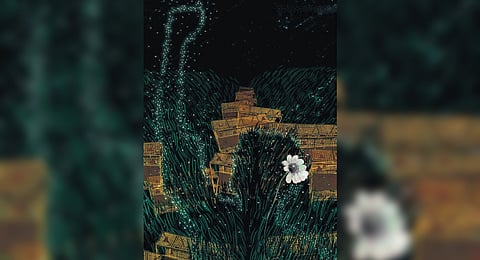

In an atmosphere of surveillance and censorship, much remains unspoken. Documentary films, in particular, inhabit a liminal space between the present and the truth, possessing the unique power to unveil unmediated realities with striking force. Prisoner No. 626710 is Present, directed by Lalit Vachani, chronicles the prolonged wait for justice as young political activist Umar Khalid endures four years of incarceration, awaiting a bail hearing.
September 13 marks four years of Khalid’s imprisonment. He was booked under UAPA by Delhi police for his “provocative speeches” and arrested as an alleged conspirator in the Delhi riots case. Vachani’s film will be screened at Jawar Bhawan, Windsor Place, at 5:30 p.m. The screening will be followed by a discussion with activist and Khalid’s partner Banojyotsana Lahiri, columnist Apoorvanand, artist Shuddhabrata Sengupta, and moderated by researcher Anirban Bhattacharya.
Vachani’s previous works explore various facets of India’s political life. The Men in the Tree is about the induction of children into the RSS, Natak Jari Hai focuses on the Delhi-based Leftwing street theatre group Jana Natya Manch, and An Ordinary Election examines the election campaign of the then-new political party, AAP.
In December 2019, while visiting his parents in Delhi and determined not to film, he couldn’t resist picking up his camera to capture the politically charged atmosphere surrounding the CAA-NRC Shaheen Bagh protests and the Jamia crackdown. “When I reviewed the footage, I realised there was an important story to tell,” he says. “I decided to make this the first film in a series I’ve been planning, focused on revisiting the Right-wing fundamentalist project.”
The urgency of this film cannot be understated, particularly in today’s political climate, where dissent is often met with heavy-handed repression. Vachani’s choice of subject matter — a young Muslim activist such as Umar Khalid —points to a larger pattern of injustice. “The fact that young Muslim activists protesting against injustice are being targeted is undeniable. If you look at the majority of people arrested, they are young Muslims,” he says.
Vachani’s film sheds light on how Umar Khalid, despite advocating non-violence, is consistently misrepresented as a violent instigator. “If you look at his speeches, time and again, he speaks about non-violence, yet the state accuses him of violence. It’s so Orwellian,” Vachani says. By piecing together the timeline of events from 2016 to 2024, the documentary offers a view of how Khalid has been “framed from the beginning”.
This film is not just a chronicle of Umar Khalid’s personal struggle, but a wider reflection on the injustices faced by young political prisoners in the country. Vachani emphasises that this story is an essential viewing for those who believe in the principles of justice and democracy. He is particularly hopeful that it will reach those who have passively accepted the narrative spun by electronic media. “I know people who had accepted what was being told to them about Umar Khalid through TV news channels. Even they were shaken after watching the film,” says Vachani.
Ultimately, this documentary, which also travelled to 16th International Documentary & Short Film Festival of Kerala (IDSFK) in July this year, serves as a call for awareness and action. While it cannot restore the years lost by political prisoners, it urges us not to let them lose more. To ensure it reaches a wider audience, Vachani is also working on a version with Hindi subtitles.